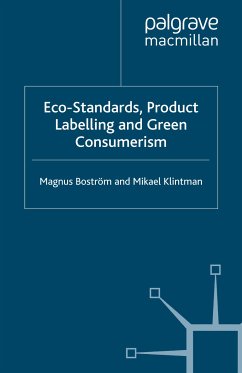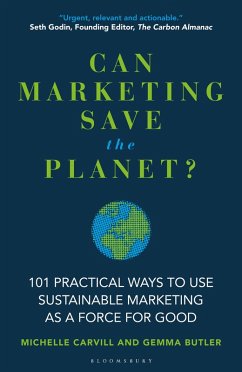
Eco-Standards, Product Labelling and Green Consumerism (eBook, PDF)

PAYBACK Punkte
36 °P sammeln!






As conscientious consumers, we become overwhelmed with alarms about food contamination, climate change, chemical pollution and other environmental and health-related risks. This book explores green and politically engaged consumersim, asking the question: does green labelling offer ways toward a greener and more democratic society?
Dieser Download kann aus rechtlichen Gründen nur mit Rechnungsadresse in A, B, BG, CY, CZ, D, DK, EW, E, FIN, F, GR, HR, H, IRL, I, LT, L, LR, M, NL, PL, P, R, S, SLO, SK ausgeliefert werden.
MAGNUS BOSTRÖM is Associate Professor in Sociology and Environmental Lecturer at Södertörn University College, Sweden. He studies environmental action, policy making, rule setting, green political consumerism, and sustainability projects in various sectors. He is co-editor of Organizing Transnational Accountability. MIKAEL KLINTMAN is Associate Professor at the Research Policy Institute, Lund University, Sweden. His research areas include environmental governance, ethical and political consumerism and the sociology of consumption.
Produktdetails
- Verlag: Palgrave Macmillan UK
- Seitenzahl: 247
- Erscheinungstermin: 1. Oktober 2008
- Englisch
- ISBN-13: 9780230584006
- Artikelnr.: 45965005
'...a significant contribution that will be useful for all social scientists interested in environmental issues as well as in political consumerism. Not least, it will be of great interest to those interested in environmental governance and the role of businesses, voluntary instruments and consumers in making society more sustainable' - Acta Sociologica
'...the rich empirical base and its many references make this a book worth buying and reading.' - Mats Bladh, International Journal of Consumer Studies
'thoughtful and ambitious...a convincing analysis of labelling as a site of political negotiation and contention, supported by well-researched case studies, which will be of interest to a broad range of social scientists,
'...the rich empirical base and its many references make this a book worth buying and reading.' - Mats Bladh, International Journal of Consumer Studies
'thoughtful and ambitious...a convincing analysis of labelling as a site of political negotiation and contention, supported by well-researched case studies, which will be of interest to a broad range of social scientists,
Mehr anzeigen
and to policymakers, marketers and civil society organizations' - Environmental Politics
'In connecting production and producers with consumption and consumers, green labels are an emerging phenomenon on today's global agenda for sustainability governance. Using a variety of theoretical perspectives and a rich empirical base, this excellent volume provides a balanced and in-depth analysis of the potentials, conditionalities, debates and drawbacks of green labeling. Highly recommended for scholars and professionals involved in environmental governance.' - Arthur P.J. Mol, Professor in Environmental Policy, Wageningen University, The Netherlands
'From snack foods to electricity to investment funds, ecolabels and other product certifications are becoming increasingly common tools for encouraging more sustainable forms of consumption. But can we trust these increasingly ubiquitous seals and labels? Is there any meaningful difference among the products that carry such endorsements? Boström and Klintman look behind the actual packaging and offer a pioneering and comprehensive account of how these assurance schemes and standards are manufactured and how they shape the buying practices of consumers in a new era of social and environmental consciousness.' - Maurie J. Cohen, New Jersey Institute of Technology, USand University of Leeds, UK
'This book focuses on a neat, compelling and important question: why trust labels and how do labels work? It shows how labelling has come to be central in environmental and other arenas worldwide, and takes us behind the scenes into the way labelling systems are maintained and made to work. The book offers sharp insights into a phenomenon that affects us all but that has barely been studied to date.' - Steve Yearley, Professor of the Sociology of Scientific Knowledge& Director of the ESRC Genomics Forum, University of Edinburgh, UK
'I recommend this book for researchers with a sound background in green issues and strong policy-orientated vocabulary who would like to further their knowledge of environmental governance.' - Sociological Research Online
'In connecting production and producers with consumption and consumers, green labels are an emerging phenomenon on today's global agenda for sustainability governance. Using a variety of theoretical perspectives and a rich empirical base, this excellent volume provides a balanced and in-depth analysis of the potentials, conditionalities, debates and drawbacks of green labeling. Highly recommended for scholars and professionals involved in environmental governance.' - Arthur P.J. Mol, Professor in Environmental Policy, Wageningen University, The Netherlands
'From snack foods to electricity to investment funds, ecolabels and other product certifications are becoming increasingly common tools for encouraging more sustainable forms of consumption. But can we trust these increasingly ubiquitous seals and labels? Is there any meaningful difference among the products that carry such endorsements? Boström and Klintman look behind the actual packaging and offer a pioneering and comprehensive account of how these assurance schemes and standards are manufactured and how they shape the buying practices of consumers in a new era of social and environmental consciousness.' - Maurie J. Cohen, New Jersey Institute of Technology, USand University of Leeds, UK
'This book focuses on a neat, compelling and important question: why trust labels and how do labels work? It shows how labelling has come to be central in environmental and other arenas worldwide, and takes us behind the scenes into the way labelling systems are maintained and made to work. The book offers sharp insights into a phenomenon that affects us all but that has barely been studied to date.' - Steve Yearley, Professor of the Sociology of Scientific Knowledge& Director of the ESRC Genomics Forum, University of Edinburgh, UK
'I recommend this book for researchers with a sound background in green issues and strong policy-orientated vocabulary who would like to further their knowledge of environmental governance.' - Sociological Research Online
Schließen
Für dieses Produkt wurde noch keine Bewertung abgegeben. Wir würden uns sehr freuen, wenn du die erste Bewertung schreibst!
Eine Bewertung schreiben
Eine Bewertung schreiben
Andere Kunden interessierten sich für











